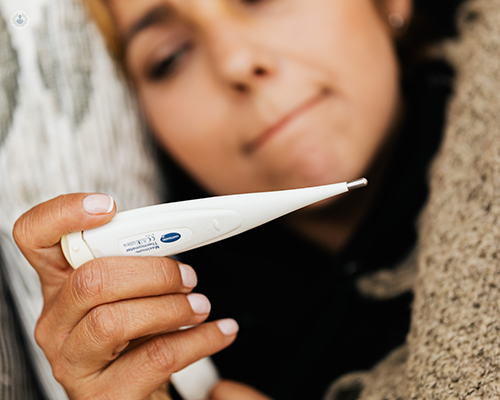Sore throat: is it tonsillitis or COVID-19?
Written in association with:You can catch tonsillitis any time of the year, but it may be more likely now that winter is coming. Tonsillitis and coronavirus can both present with fever and a sore throat, which may leave you a little confused. There are, however, other associated symptoms that differentiate between the two. Here, one of our leading ENT surgeons Mr Sharan Jayaram explains more, including what to do if you suspect that you have either condition.

Is a sore throat a symptom of coronavirus?
Although sore throat could be a symptom in coronavirus infections, it is relatively less common. The most common specific symptoms of coronavirus are cough, fever, and fatigue. However, if you do have a sore throat, it is best to self-isolate and get tested, especially if associated with other coronavirus symptoms.
What are the symptoms of tonsillitis?
The main symptoms of tonsillitis are fever, sore throat, pain whilst swallowing and swollen lymph glands in the neck. Often, one can see swollen red tonsil on self-examination of the throat.
How can we differentiate between the two conditions?
Fever and sore throat are the only symptoms that are common to these two conditions. One can try to differentiate between the two by assessing other associated symptoms.
Tonsillitis is usually associated with pain whilst swallowing and swollen lymph glands in the neck, whereas coronovirus infections could be associated with cough, fatigue, loss of sense of smell, chest pain and shortness of breath.
Do you think patients will confuse both conditions as we go into flu season?
Since flu and mild coronavirus infections can cause similar symptoms, the only way to confidently differentiate between the two is by getting tested for coronavirus.
What should someone do if they think they have tonsillitis during the COVID-19 era?
It would be best to stay at home and call your GP. If the doctor feels that the symptoms fulfil some criteria to be termed bacterial tonsillitis, antibiotics may be sent to you. If there is a suspicion of coronavirus, your GP may recommend a COVID test.
One should also follow simple measures such as staying hydrated, salt-water gargles, throat lozenges and using paracetamol.
Is tonsillectomy still available at the moment? What precautions are being taken?
Tonsillectomy is only being offered for specific indications such as suspicion of cancer. Patients are asked to self-isolate and get two coronavirus swab tests prior to the procedure.
Mr Jayaram specialises in treating neck lumps, throat cancer, tonsillitis and voice disorders. You can book an appointment to see him via his Top Doctor’s profile here.



